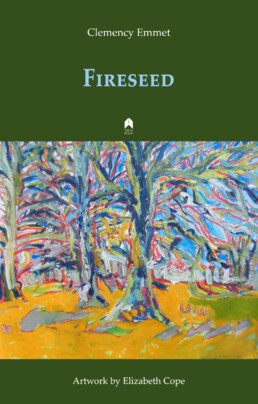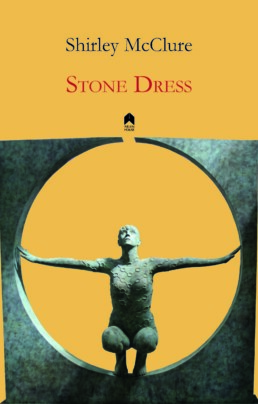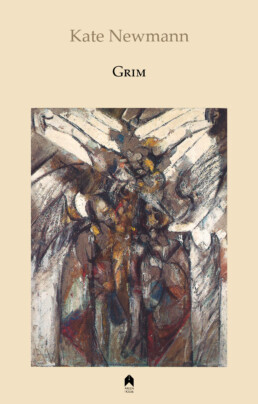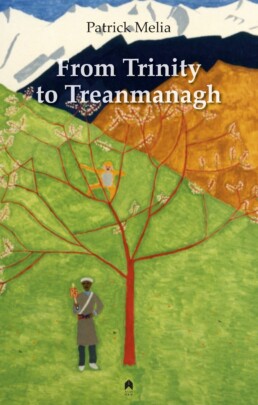Girls of the Globe
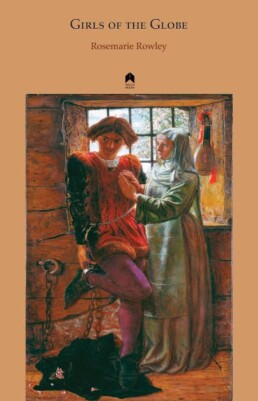
Rosemarie Rowley
Girls of the Globe
ISBN: 9781851321179
Some Responses to Rosemarie Rowley’s Work
‘Lyrics of a rare strength and delicacy’
– John McGahern
‘I like the poems … I keep hearing something in them
that I’m always listening for … and rarely catch’
– Ted Hughes
‘Originality, commitment, and real literary ability’
– Eiléan Ní Chuilleanáin
‘Her range of vocabulary and phrasing is impressive …
a true poet … her finest poems wear their learning
lightly – she excels as a critic’
– Declan Kiberd
‘A master of form’
– Brendan Kennelly
Rosemarie Rowley, born in Dublin in 1942, has written extensively in form, including terza rima, rhyme royal and rhyming couplets. She is a four times winner of the Epic Award in the Scottish International Open Poetry Competition and has published six poetry collections since the 1980s.
Fireseed
Fireseed
Hardly asleep when the dawn comes,
unyielding in bare, grey light,
I rise reluctantly.
The cold seizes my bones,
outside the blurred shape of cattle wait,
heavy in their dependency.
The shadowy kitchen shows me
cold stone floor and I search
for the one glowing sod of turf
buried deep in the grey ash.
The incandescent seed
which survived the frozen night.
Invincible element of fire,
bursting into nourishment of flame.
Dambatheanga / Damlanguage
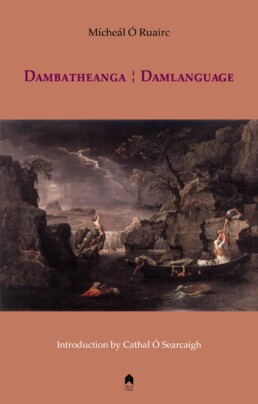
Micheál Ó Ruairc
Dambatheanga / Damlanguage
ISBN:
9781851321056 limited edition
It’s High Noon and unarmed language-militants are in the trenches or lobbing language grenades over half-doors in the Gaeltacht, linguistic dambuster and poet, Seán Ó Ríordáin, is frantically manning the Inniscarra Dam so as to prevent the torrents of Jargon from flooding his beloved city, a pair of star-crossed lovers observe their love being burnt to a cinder on a bonfire at the dead of night; at the dead of night also a Nitelink is bearing a busload of lost souls towards Oblivion while in another poem a middle-aged man is endeavouring to get his Stone Boat to float.
This collection of poetry, Ó Ruairc’s first since 2001, brings into sharp focus the full range of this poet’s talents and his take on Ireland in the 21stcentury. The book reads like a poetic rollercoaster ride that is impossible to put down, veering from the sublime to the ridiculous and expressing a wide range of emotions in the process. It is a tour de force that will live long in the memory. As Cathal Ó Searcaigh so succinctly puts it in his Introduction: ‘With his keen vision for renewal he risks new options, and shapes new strategies in Gaelic verse. He is a challenger to our conformities … “a linguistic dambuster”’.
High Noon atá ann agus tá teangamhíleataigh neamharmtha sna trinsí nó ag labáil teangaghranáidí thar leathdhoirse sa Ghaeltacht, tá an dambóir teanga agus an file, Seán Ó Ríordáin, tagtha chun fóirithint a thabhairt mar dhamba Inis Cara ionas nach ndéanfaidh díle an Bhéarlagair a chathair ionúin a threascairt, féachann lánúin réaltchrosáilte ar a ngrá á dhó ar thine chnámh ag uair mhairbh na hoíche, ag uair mhairbh na hoíche freisin tá Nitelink ag iompar lán bhus d’anamacha damanta go Tír an Dearmaid faid is atá fear meánosta i ndán eile ag iarraidh a Bháid Chloiche a chur ag snámh.
Tugann an bailiúchán filíochta seo, an chéad cheann ag Ó Ruairc ó 2001, chun cruinne géire réimse iomlán tallainne an fhile seo agus a dhearcadh ar Éirinn san aonú haois is fiche. Is geall le rollchóstóir de mharcaíocht fhileata é an leabhar gur deacair é a leagan anuas, é ag scinneadh ó shúgradh go dáiríre agus ag cuimsiú réimse leathan mothúchán ag an am céanna. Tour de force atá ann a mhairfidh i bhfad i gcuimhne an léitheora. Mar a deir Cathal Ó Searcaigh go hachomair ina Réamhrá: ‘With his keen vision for renewal he risks new options, and shapes new strategies in Gaelic verse. He is a challenger to our conformities … “a linguistic dambuster”’.
An Fear Glas The Green Man
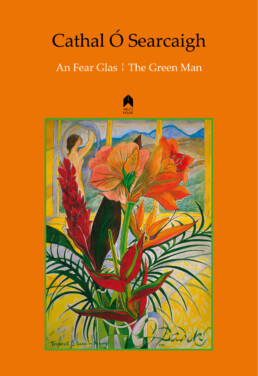
Cathal Ó Searcaigh
The Green Man
ISBN:
9781851321216 paperback
9781851321223 limited edition
Ó Searcaigh mixes the open-singing eroticism of Whitman with a sharp eye for the profound minutiae of the physical world, and he often adds a surprising touch of irony to the blend. It’s the rare poet who can imagine sheep as paperweights who keep the fields from blowing away.
Billy Collins
Poet Laureate of the United States, 2001–2003
Cavafy knew well that his poems would not be acceptable to his contemporaries; but he was prepared to pay the price and carried on. How gratifying, then, for admirers of the homoerotic tradition in poetry and in art generally, to see that the tide is finally turning – and for those of us who take an interest in Irish, to see also the international setting that the language has found for itself in Cathal Ó Searcaigh’s most recent work.
Eoghan Mac Aogáin
One of the major poets of modern Ireland, Cathal Ó Searcaigh has made a huge contribution to the range and scope of Irish language literature over the past four decades. This volume, drawn from six ground-breaking collections published over the past fifteen years, testifies to his lyrical genius and his enduring importance at the very heart of what is happening in Gaelic literature today. Here, Paddy Bushe, Gabriel Rosenstock and Frank Sewell, three of the most noted translators of contemporary Irish language literature, use the full range of their brilliance to render Ó Searcaigh’s work into faithful but fully realized English language poems.
Tá Cathal Ó Searcaigh in ard a chumais, é éirithe ó thalamh as an duibheagán. Is aoibhinn liom na bundánta, an charthain iontu a mheall riamh sinn chun nádúir na Gaeltachta.
Liam Ó Muirthile
Tá Cathal Ó Searcaigh ar an bhfile is binne agus is milse béil in Éirinn. Bhí tuiscint riamh ann gur cheart don fhilíocht freastal ar an áilleacht agus ar an iontas, agus sin é a dhéanann sé siar amach. Laoithe cumainn d’eacstais an tsaoil is ea an chuid is fearr dá shaothar agus tugann sé cuireadh isteach dúinn do charnabhal na beatha. Is é atá torrach le haoibhneas is cuma an ag trácht ar a óige féin, ar a cheantar dúchais, nó ar an ngrá corpartha is spioradálta atá sé, agus tá chomh snoite líofa ina chuid dánta fada agus atá sna liricí snasta a bhfuil sé ina mháistir orthu. Ócáid ghairdeachais foilsiú gach leabhair uaidh.
Alan Titley
Ó Searcaigh celebrates the simple joys of nature and of place in a style full of classical serenity and meditative calm. The poet reinvents the self and the word in these intimate, compassionate, visionary, musical, obliquely political poems, rich in colourful visuals and teeming with positive energy.
- Satchidanandan
In Cathal Ó Searcaigh’s poetry, the unexpected rises to the surface like foam formed under a waterfall during the spring thaw. His poetry is both startling and refreshing.
Bill Wolak
Stone Dress
Like the Shipwreck Bag in her poem ‘Shipwrecked’, ‘a sack of supplies every Sunday –/ bullseyes, fake cigarettes and spicy liquorice pipes …’ Shirley McClure’s eagerly awaited second collection is a most satisfying assortment of beautifully wrought surprises. In here are poems by turns clear-eyed, poignant, unsparing, sexy and often just plain funny – and not an ounce of sentimentality in the carefully weighed-out mix. McClure has a gift for close observation and a quietly mordant, ironising sense of humour. But these poems are not just clever. Here too are exquisite love poems and deeply moving poems of grief, illness and loss, captured unerringly in the minutiae of immediately recognisable, but rarely recorded, detail. And running through it all is a homage to the female body, to its strengths and vulnerabilities, its beauty and its blemishes, so deftly captured in ‘Stone Dress’, the title poem, which ends:
‘This was where she felt safest,
in the landscape of their folds and scars;
no jokes about her hard neck, thick skin,
here in the stone circle of her friends.’
– Geraldine Mitchell
I love McClure’s very particular combination of qualities – the ebullience, the wit, the honesty and insight, the strength and tenderness. Also, her generosity to the reader – who is welcomed in with such grace and openness.
– Mimi Khalvati
Shirley McClure’s work is of great distinction and merit. She has a particularly ironic ‘take’ on modern Irish reality and is a rare and necessary antidote to all the navel-gazing that is going on in this country at the moment.
– Nuala Ní Dhomhnaill
Grim
A profound realisation of suffering unequalled in Irish poetry. This volume of emotionally courageous poems is destined to find an enduring place in the canon of Holocaust literature. To read these poems is to taste sorrow.
– Cathal Ó Searcaigh
Susan Sontag has delineated the pornography of fascism; these powerful poems chart its lunacy, its aberrant, horrific, distortions of reason.
– Paula Meehan
Kate Newmann’s approach goes deep into the immediate record and finds a poem there. She does it horribly well.
– John Kerrigan, Professor of English 2000, University of Cambridge
Refusing false consolations, this book grapples with the dreadful knowledge of the real. Instead of trying to awaken from the nightmare of history, Kate Newmann composes a haunting soundscape that bears necessary witness.
– Theodore Deppe, Director of Stonecoast Programme in Ireland, University of Maine
Before reading English at King’s College, Cambridge, Kate Newmann worked at the Museum of Cretan Ethnology. After graduating, she taught English as a foreign language in Oxford and Rhodes, and was appointed Junior Fellow at the Institute of Irish Studies, Queen’s University, Belfast, where she compiled and published the Dictionary of Ulster Biography (1993). Her third collection of poetry, I Am a Horse was published in 2011 by Arlen House and three of the poems were recorded on a CD, How Well Did You Love? She has won the Listowel Poetry Prize and the Roundyhouse Poetry Prize, among others, and has been shortlisted for the UK’s National Poetry Competition.
Forget the Lake
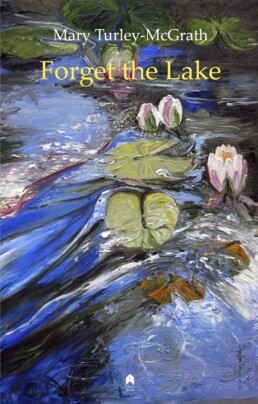
Mary Turley-McGrath
Forget the Lake
ISBN: 9781851320936
Water is everywhere in these poems: lake water, river water, the sea in all its moods and guises. Perhaps this is what gives the book its fluidity and lightness, the grace that frames the collection’s humane empathies. Mary Turley-McGrath’s well cast epiphanies are as likely to come from her meditations on art as from her keen observations of the natural world, or from the scrutiny of family attachments and lineage, the deep heart’s core
– Paula Meehan
Mary Turley-McGrath’s work ranges wide through time and place, nature and art. She is equally at home in Pablo Picasso’s Spain and Patrick Kavanagh’s Ireland. Whether she is in Marbella or on Baggot Street she seeks ‘care of heart’, ‘beauty of mind’, ‘strength of hand’. She loves both the seasonality of the countryside and the exoticism of distance, but the romance has a foundation in realism: whether her imagination takes her as far as Rangoon, she is not blind to the fact that old Burma is new Myanmar, a contested place where priests are beaten in the street. But everywhere she goes she wants to find a quality of physical and mental light that has about it ‘a keener dazzle’
– Brian Lynch
Transitions
The lake became an estuary overnight;
besieged by hammering rain,
flattened, subdued to shallows
of dark foil-strips between trees.
The drooping hazels and alders offered
no consolation; the sky was falling,
impaling itself on tips of forest pines;
it descended to enwrap the lake.
The heron had left for the lawn,
neck pushed forward in disdain;
the deluge had soaked him
to an alabaster shape. Then, near
the copper beech, he took flight
across the grass and was gone.
Pagan To The Core
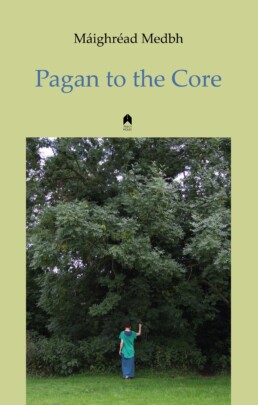
Máighréad Medbh
Pagan To The Core
ISBN: 9781851320882
Máighréad Medbh’s gaze is unflinching whether it’s turned on her West Limerick country girlhood, her turbulent emergence into the life of the city and work, or her own consciousness as it negotiates awakening and motherhood. This is courageous poetry, charting the journey of the female soul through an almost clinical exploration of the female body’s desires and vulnerabilities. She is not afraid to call it as she sees it and if her truth telling is uncomfortable, it is also liberating and slightly surreal — as if one had just had a cup of tea with a brown bear. In her den. Her narrators are often in extreme states: of rejection, ecstasy, sexual arousal or the ‘disaffection’ of the new sequence. Sometimes these poems are very funny indeed: both funny ha ha and funny peculiar. Maps to zones of the psyche that are rarely explored in Irish poetry, they are built to be experienced on the pulse, and ‘in the deep heart’s core’.
– Paula Meehan, Ireland Professor of Poetry, 2013
she’s surprised they ask her family name and origin.
she has not begun, don’t they know, to call herself.
she is arty not artist, servant uncivil, urbane rustic,
universal irish, limerick by element only.
name her alpha.
– from ‘Eating Out’
From Trinity to Treanmanagh
“The babies, Poppy and Holly, seemed to me the most precious things I had ever seen. I suppose this is a phenomenon that ensures the survival of the species. Holly was full of ebuliant humour which could alternate with temper to the extent that earned her the nickname Thunderball, but it was soon over. Poppy, on the other hand, was calm and sensible and wise beyond her years.
Our next move was another step towards the country and its inhabitants. It took us further than the step from London to Dublin. The gulf between Dublin and Kerry was like crossing to another continent. First the accent was so impenetrable that I could hardly understand anything that was said to me. After six months I could make out some of the words, but then, although I could distinguish the words, they did not seem to make any sense to me. Despite this the patients expressed great satisfaction with their treatment. I worked at Killarney Hospital and at out-patient clinics throughout the county in the Kerry Psychiatric Service”.
In Between Angels and Animals
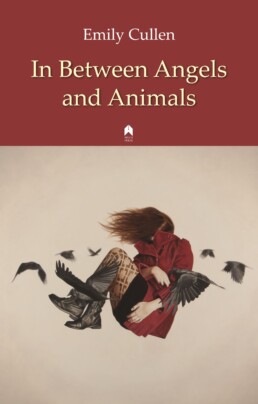
Emily Cullen
In Between Angels and Animals
ISBN: 9781851320790
Some critical responses to Emily Cullen’s work:
“With No Vague Utopia (Ainnir, 2003), Emily Cullen has produced a gem … Her themes surround recollections and ephemera, paeans to moments in time, vividly recalled. Her language is rich and vibrant, and her metre musical and textured. While each poem is a personal expression of one woman’s experience, Cullen’s ability to vividly describe and render these experiences ensures that her readers can recreate each moment with her”
– The Stinging Fly, 2004
“the style … is sturdily lyrical, the voice is confident and erudite, the vision insightful, the promise immense. This achievement – just that – notable”
– Black Mountain Review, 2003
“She is always that small distance apart. Noticing and then crafting those perceptions into shape, she is adept at formalizing … There are half-rhymes scattered niftily here and there, always the sign of a writer who loves what they are doing … Emily is an example of new European-wide influences bringing in richer texture and wider subject-matter into Irish writing as in ‘Two landmarks locked in dialogue’”
– The Lantern Review, 2004

